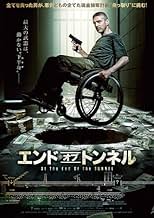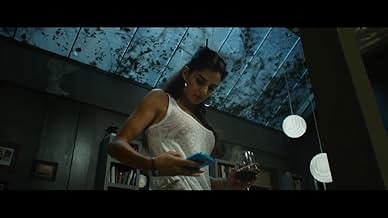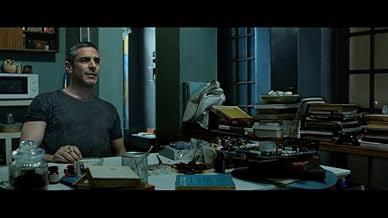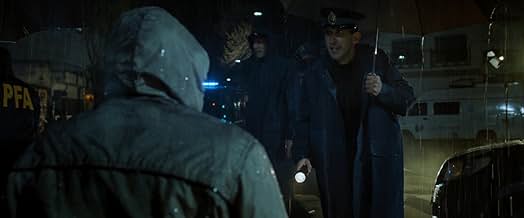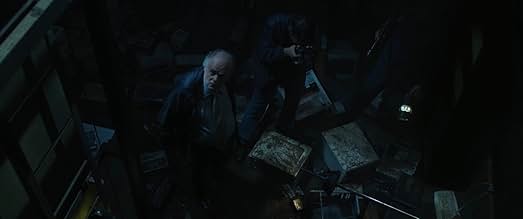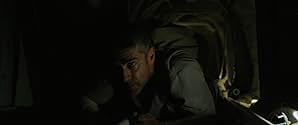AVALIAÇÃO DA IMDb
7,0/10
16 mil
SUA AVALIAÇÃO
Um engenheiro informático paraplégico em uma cadeira de rodas começa a ouvir ruídos e vozes de assaltantes de bancos em seu porão.Um engenheiro informático paraplégico em uma cadeira de rodas começa a ouvir ruídos e vozes de assaltantes de bancos em seu porão.Um engenheiro informático paraplégico em uma cadeira de rodas começa a ouvir ruídos e vozes de assaltantes de bancos em seu porão.
- Prêmios
- 4 vitórias e 5 indicações no total
Facundo Giménez
- Schwarzenegger
- (as Facundo Nahuel Giménez)
Ariel Núñez Di Croce
- Muñeco
- (as Ariel Núñez)
Cristóbal Pinto
- Pichi
- (as Cristobal Pinto)
Daniel Comini
- Cervantes
- (as Daniel Morales Comini)
Sergio Santana
- Policía 2
- (as Sergio López Santana)
Avaliações em destaque
Original and ingeniously basic premise full of tense images and intrigue in spite of developing only one scenario . Dealing with a paraplegic computer engineer that moves in a wheelchair . This freaky and clever film chronicles fear , desperation , paranoia of a computer expert called Joaquín (Leonardo Sbaraglia) who faces off a completely Kafkaesque situation when in his cellar starts hearing noises and voices of bank-robbers whose leader results to be a really violent murderer called Galereto (Pablo Echarri , also producer) . This is a thrilling film in which the paraplegic starring quest to find answers and solutions to vanquish some extremely violent delinquents (Walter Donado , Laura Faienza , Facundo Nahuel Giménez , Javier Godino) and subsequently planning steal the bank , creating an alternate access to the tunnel , just before them . Joaquin works repairing old computers and is threaten by foreclose , he then rents one room to Berta , a beautiful young girl (Clara Lago) , and Betty (Uma Salduende) , her six-years-old daughter . Berta lives with the drama of his autistic daughter , who two years ago stopped to talk unexpectedly . At the beginning uneasy coexistence gradually softens , turning in a friendship and a romance between them .
The picture succeeds because of the thriller , tension , as well as a superbly written script delving into the human psyche in such extreme situation and our instinctive urges for survival . As the paraplegic executes set-ups that will threaten all the plan provided by the criminal robbers , though Joaquín's scheme crashes against a couple of secrets about Berta and her daughter . The paraplegic very well performed by Leonardo Sbaraglia works utilizing his skills and talents to survive the deadly trap , as using his intelligence he attempts to avoid the robbers carry out their aims , but at the same time he is blocked emotionally by the remembers of his wife and daughter , dead after an accident time ago . Despite the claustrophobic scenarios and average budget the picture manages to be intelligent , intriguing and thrilling . The good thing about this film is that the director made it on limited scenarios , only having to do one or two sets , yet the movie works on many levels but is constantly reconfigured . Very fine acting by Leonardo Sbaraglia as Joaquín , a computer engineer in wheelchair trapped by the imminent foreclose of his house due to the debt with his bank . Clara Lago also shines as an exotic dancer who is really a lure sent by the chief of a little band that they are digging a long underground tunnel . And support cast is frankly excellent , such as an extremely baddie , masterfully played by Pablo Echarri , along with Walter Donado , Facundo Giménez and Javier Godino . Special mention for the veteran and very old Federico Luppi , here playing a killer Police Inspector .
Stirring and intriguing musical score fitting to tension by two great composers : Lucio Godoy and Federico Jusid . Splendid cinematography , and naturally , plenty of dark and shades by Félix Monti . The motion picture , decently produced by Gerardo Herrero and Axel Kuschevatzky , was professional and originally written and directed by Rodrigo Grande . Rodrigo was born (1974) in Rosario, Santa Fe, Argentina . He is a fine writer and director, known for Historias Breves 2 (1997) , Presos Del Olvido (2001), Cuestión De Principios (2009) and this Al Final Del Túnel (2016) at his best , being his fetish actor Federico Luppi who here plays a corrupt cop . Rating : Good , better than average
The picture succeeds because of the thriller , tension , as well as a superbly written script delving into the human psyche in such extreme situation and our instinctive urges for survival . As the paraplegic executes set-ups that will threaten all the plan provided by the criminal robbers , though Joaquín's scheme crashes against a couple of secrets about Berta and her daughter . The paraplegic very well performed by Leonardo Sbaraglia works utilizing his skills and talents to survive the deadly trap , as using his intelligence he attempts to avoid the robbers carry out their aims , but at the same time he is blocked emotionally by the remembers of his wife and daughter , dead after an accident time ago . Despite the claustrophobic scenarios and average budget the picture manages to be intelligent , intriguing and thrilling . The good thing about this film is that the director made it on limited scenarios , only having to do one or two sets , yet the movie works on many levels but is constantly reconfigured . Very fine acting by Leonardo Sbaraglia as Joaquín , a computer engineer in wheelchair trapped by the imminent foreclose of his house due to the debt with his bank . Clara Lago also shines as an exotic dancer who is really a lure sent by the chief of a little band that they are digging a long underground tunnel . And support cast is frankly excellent , such as an extremely baddie , masterfully played by Pablo Echarri , along with Walter Donado , Facundo Giménez and Javier Godino . Special mention for the veteran and very old Federico Luppi , here playing a killer Police Inspector .
Stirring and intriguing musical score fitting to tension by two great composers : Lucio Godoy and Federico Jusid . Splendid cinematography , and naturally , plenty of dark and shades by Félix Monti . The motion picture , decently produced by Gerardo Herrero and Axel Kuschevatzky , was professional and originally written and directed by Rodrigo Grande . Rodrigo was born (1974) in Rosario, Santa Fe, Argentina . He is a fine writer and director, known for Historias Breves 2 (1997) , Presos Del Olvido (2001), Cuestión De Principios (2009) and this Al Final Del Túnel (2016) at his best , being his fetish actor Federico Luppi who here plays a corrupt cop . Rating : Good , better than average
My opinion-.
"At the end of the tunnel" is a movie by Rodrigo Grande and a thriller policeman realized with a small budget, but with far greater effects than some great productions, everything is there, a super scenario and a plot that takes you more and more That one advances in this movie. If you like good suspense, look at it, it is worth it.
"At the end of the tunnel" is a movie by Rodrigo Grande and a thriller policeman realized with a small budget, but with far greater effects than some great productions, everything is there, a super scenario and a plot that takes you more and more That one advances in this movie. If you like good suspense, look at it, it is worth it.
At the End of the Tunnel proves that the most compelling heist films aren't always about the criminals pulling the job, but about the ordinary person caught in their crosshairs. This Argentine-Spanish thriller from director Rodrigo Grande transforms a simple premise into a gripping exercise in mounting tension, where every creak of the floorboards carries weight and every glance through a basement window feels loaded with danger.
Joaquín is a wheelchair-bound computer engineer threatened with foreclosure, haunted by memories of his wife and daughter who died in an accident years ago. Leonardo Sbaraglia inhabits this role with remarkable restraint, never playing for sympathy but instead crafting a fully realized character whose physical limitations become tactical advantages. His performance anchors the film's emotional core, particularly in his scenes with Spanish actress Clara Lago, who plays Berta, the exotic dancer renting a room in his crumbling house with her mysteriously silent daughter Betty.
The genius of Grande's direction lies in how he uses the confined space of Joaquín's basement workshop to create an atmosphere of voyeuristic dread. When Joaquín discovers that criminals are digging a tunnel under his house to rob the bank next door, the film shifts into thriller territory without abandoning its character-driven foundation. The camera work emphasizes the claustrophobic nature of Joaquín's world while simultaneously opening up moments of surprising intimacy between the unlikely housemates.
Pablo Echarri delivers a masterful performance as the villain, bringing a chilling matter-of-factness to his criminal mastermind that makes him far more unsettling than any scenery-chewing antagonist. The supporting cast, including veteran Federico Luppi as a corrupt police inspector, creates a lived-in world where everyone carries secrets and motivations run deeper than surface appearances suggest.
What elevates this film beyond standard thriller mechanics is its commitment to exploring themes of isolation, second chances, and the lengths people go to protect those they love. The revelation that Berta is connected to the criminal operation doesn't feel like a cheap plot twist but rather an organic development that deepens both characters' emotional stakes. The film earns its moments of violence and tension through careful character development, making every confrontation feel personal rather than perfunctory.
Grande demonstrates impressive control over pacing, allowing quiet character moments to breathe while ratcheting up suspense through sound design and strategic reveals. The basement setting becomes almost a character itself, with its maze of electronic equipment and hidden vantage points creating opportunities for both surveillance and surprise. The film's visual language emphasizes horizontal movement and hidden perspectives, reinforcing themes about seeing and being seen, knowing and being known.
While the film occasionally leans into familiar thriller territory, particularly in its final act, the strength of the performances and the genuine emotional investment in these characters keeps it compelling throughout. Grande's enjoyable caper film ratchets up tension even as it folds in smile-inducing plot twists. This isn't a film that revolutionizes the heist genre, but it executes its premise with enough intelligence and heart to make it genuinely engaging.
The film succeeds because it understands that the best thrillers aren't just about external dangers but internal transformations. Joaquín's journey from isolated recluse to reluctant hero feels earned, and the relationships he forms feel authentic rather than manufactured for plot convenience. In an era of increasingly elaborate heist films, "At the End of the Tunnel" reminds us that sometimes the most effective approach is simply to dig deeper into character and let tension build naturally from genuine human stakes.
Joaquín is a wheelchair-bound computer engineer threatened with foreclosure, haunted by memories of his wife and daughter who died in an accident years ago. Leonardo Sbaraglia inhabits this role with remarkable restraint, never playing for sympathy but instead crafting a fully realized character whose physical limitations become tactical advantages. His performance anchors the film's emotional core, particularly in his scenes with Spanish actress Clara Lago, who plays Berta, the exotic dancer renting a room in his crumbling house with her mysteriously silent daughter Betty.
The genius of Grande's direction lies in how he uses the confined space of Joaquín's basement workshop to create an atmosphere of voyeuristic dread. When Joaquín discovers that criminals are digging a tunnel under his house to rob the bank next door, the film shifts into thriller territory without abandoning its character-driven foundation. The camera work emphasizes the claustrophobic nature of Joaquín's world while simultaneously opening up moments of surprising intimacy between the unlikely housemates.
Pablo Echarri delivers a masterful performance as the villain, bringing a chilling matter-of-factness to his criminal mastermind that makes him far more unsettling than any scenery-chewing antagonist. The supporting cast, including veteran Federico Luppi as a corrupt police inspector, creates a lived-in world where everyone carries secrets and motivations run deeper than surface appearances suggest.
What elevates this film beyond standard thriller mechanics is its commitment to exploring themes of isolation, second chances, and the lengths people go to protect those they love. The revelation that Berta is connected to the criminal operation doesn't feel like a cheap plot twist but rather an organic development that deepens both characters' emotional stakes. The film earns its moments of violence and tension through careful character development, making every confrontation feel personal rather than perfunctory.
Grande demonstrates impressive control over pacing, allowing quiet character moments to breathe while ratcheting up suspense through sound design and strategic reveals. The basement setting becomes almost a character itself, with its maze of electronic equipment and hidden vantage points creating opportunities for both surveillance and surprise. The film's visual language emphasizes horizontal movement and hidden perspectives, reinforcing themes about seeing and being seen, knowing and being known.
While the film occasionally leans into familiar thriller territory, particularly in its final act, the strength of the performances and the genuine emotional investment in these characters keeps it compelling throughout. Grande's enjoyable caper film ratchets up tension even as it folds in smile-inducing plot twists. This isn't a film that revolutionizes the heist genre, but it executes its premise with enough intelligence and heart to make it genuinely engaging.
The film succeeds because it understands that the best thrillers aren't just about external dangers but internal transformations. Joaquín's journey from isolated recluse to reluctant hero feels earned, and the relationships he forms feel authentic rather than manufactured for plot convenience. In an era of increasingly elaborate heist films, "At the End of the Tunnel" reminds us that sometimes the most effective approach is simply to dig deeper into character and let tension build naturally from genuine human stakes.
But what was the point of bomb when it take few hammer hits to break through the vault?
I have never seen a heist movie with this kind of plot twists. This is unguessable as well as trickily executed. One most indulging factor is the protagonist is cripple yet how he protect himself along with the bank money is amazing.
Você sabia?
- CuriosidadesJoaquin has a statue very similar to the Maltese Falcon. One of the characters, Gutman, may very well be named after Kasper Gutman from the film The Maltese Falcon (1941).
- Erros de gravaçãoWhen Guttman hit the red pick up at the end of the movie, a first scene showed the pick-up was moving. However, the scene from inside the car right before he hit the pick-up shows that the pick-up is stand still.
Principais escolhas
Faça login para avaliar e ver a lista de recomendações personalizadas
- How long is At the End of the Tunnel?Fornecido pela Alexa
Detalhes
Bilheteria
- Orçamento
- € 2.000.000 (estimativa)
- Faturamento bruto mundial
- US$ 3.190.219
- Tempo de duração
- 2 h(120 min)
- Cor
- Mixagem de som
- Proporção
- 2.35 : 1
Contribua para esta página
Sugerir uma alteração ou adicionar conteúdo ausente

![Assistir a Tráiler [OV]](https://m.media-amazon.com/images/M/MV5BMzU1OTIxZmItNjAzNC00NzNhLWIyZmQtZWZmMTJiMjU2ZDk0XkEyXkFqcGdeQXRodW1ibmFpbC1pbml0aWFsaXplcg@@._V1_QL75_UX500_CR0)
